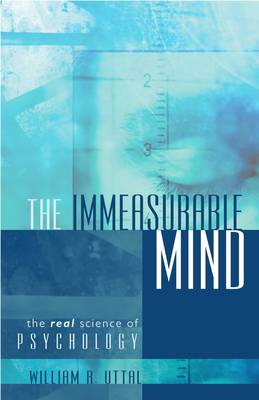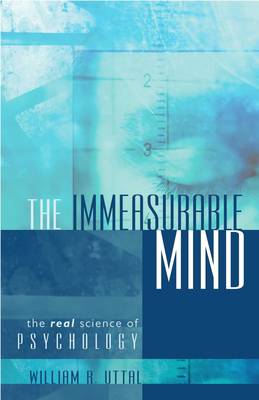
Bedankt voor het vertrouwen het afgelopen jaar! Om jou te bedanken bieden we GRATIS verzending (in België) aan op alles gedurende de hele maand januari.
- Afhalen na 1 uur in een winkel met voorraad
- In januari gratis thuislevering in België
- Ruim aanbod met 7 miljoen producten
Bedankt voor het vertrouwen het afgelopen jaar! Om jou te bedanken bieden we GRATIS verzending (in België) aan op alles gedurende de hele maand januari.
- Afhalen na 1 uur in een winkel met voorraad
- In januari gratis thuislevering in België
- Ruim aanbod met 7 miljoen producten
Zoeken
€ 34,95
+ 69 punten
Omschrijving
Is psychology a science? Unlike Darwinian theory in biology or relativity and quantum theory in physics, psychology lacks the basic quantitative or conceptual foundation for a consensus view about how the mind works. Is psychology on the verge of developing such a foundation? "Probably not," answers psychologist William R. Uttal in this iconoclastic and critical examination of psychology's underlying principles, assumptions, and concepts. In five in-depth chapters and one appendix, he explores the following key issues: *What do we mean by "science" and can psychology be legitimately described as a science?*What are the general principles that should be applied to any science?*What is the role of mathematics in psychology?*Given the current fragmented state of the discipline, is it possible to identify the general principles of a scientific psychology?*Is experimental psychology just applied epistemology and not really scientific?Uttal comes to the conclusion that psychology is a science only to the extent that it is behaviorist in orientation. By comparing his discipline to other sciences, he identifies its limits, establishes a set of principles that help to define psychology as a science, and suggests plausible future developments.
Specificaties
Betrokkenen
- Auteur(s):
- Uitgeverij:
Inhoud
- Aantal bladzijden:
- 289
- Taal:
- Engels
Eigenschappen
- Productcode (EAN):
- 9781591025252
- Verschijningsdatum:
- 5/06/2007
- Uitvoering:
- Hardcover
- Formaat:
- Genaaid
- Afmetingen:
- 161 mm x 235 mm
- Gewicht:
- 535 g

Alleen bij Standaard Boekhandel
+ 69 punten op je klantenkaart van Standaard Boekhandel
Beoordelingen
We publiceren alleen reviews die voldoen aan de voorwaarden voor reviews. Bekijk onze voorwaarden voor reviews.









